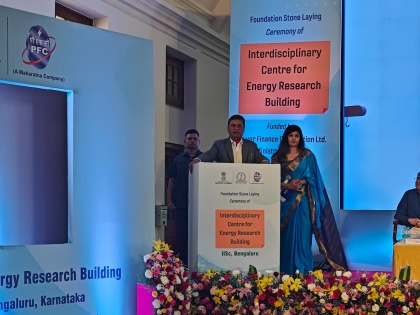India has emerged as a leader, Industries should come forward and make their patents: Union Cabinet Minister RK Singh
By Anubha Jain | Published: December 31, 2023 02:02 PM2023-12-31T14:02:00+5:302023-12-31T14:03:18+5:30
“By 2030 we will have 40% capacity of power coming from nonfossil fuels sources. We achieved the target in ...

India has emerged as a leader, Industries should come forward and make their patents: Union Cabinet Minister RK Singh
“By 2030 we will have 40% capacity of power coming from nonfossil fuels sources. We achieved the target in 2021, i.e., 9 years in advance. Today the total installed capacity of 43% is non-fossil which means 187 thousand MGW of nonfossil capacity. Our rate of growth is the fastest. India has already emerged as a leader.” In a momentous event marking a significant leap in scientific advancement, R. K. Singh, Hon'ble Union Cabinet Minister for Power and New & Renewable Energy, said this while laying the Foundation Stone for the construction of the new Interdisciplinary Centre for Energy Research (ICER) building at the Indian Institute of Science (IISc) Bengaluru, supported by Power Finance Corporation (PFC) under its Corporate Social Responsibility (CSR) initiative today in Bengaluru. This monumental project was unveiled in the presence of key dignitaries including K.J. George, Minister of Energy, Government of Karnataka; P.C. Mohan, Member of Parliament, Lok Sabha Central constituency, Bengaluru; Tejasvi Surya, Member of Parliament, Lok Sabha South constituency, Bengaluru; Manoj Sharma, Director (Commercial), PFC & Shri Ali Shah, Executive Director, CSR, PFC. This marks a crucial step towards shaping the future of energy research and sustainable technologies.
RK Singh further said, “We have set up 85% of wind energy from our manufacturing sources. We export wind energy turbines from India. India is supporting solar cells and modules. We have a 42000 MGW manufacturing capacity for solar cells and modules. We have a 48000 MGW manufacturing capacity of solar cells and modules under construction. India’s transmission system is an example of leading technology. The entire country is connected with a single grid. The government will take all the measures to make India competitive in producing green hydrogen. In the energy sector, India has transformed tremendously the energy sector. Today’s India is different from the older India. We have universal access to energy. The government has electrified every village and hamlet and it has connected every home with power. We electrified 29 million homes in 19 months, and the International Energy Agency (IEA) called it the largest and the fastest expansion of energy access ever," he said. RK Singh said that we are leading and as the Indian economy is growing, the demand has gone up. Over 9 years from 2014, the demand has increased up to 107 thousand MGW, i.e., from 136 thousand MGW in 2014 to 243 thousand MGW now. The government’s focus is on more efficient modules. Primitive advancement is good enough. The government has put in place all the facilities and a research budget. Singh was disappointed and said that there is a lack of groups or sectors coming together or working together. Science and industries should come forward and work together. Bankers or the banking system should come forward and help industrialists. We need to make our patents. We need Indian technology. That is something that needs to be changed, he said. RK Singh said that the government will partner with the industry to develop technology for fuel cells, hydrogen storage, and other technologies needed for developing a green hydrogen ecosystem in the country. It is pertinent to mention that the financial assistance of Rs. 60.74 Crores sanctioned by PFC under its CSR initiative for the construction of a new ICER building is an example of collaborative efforts in advancing research and development in the energy field. This support signifies PFC’s dedication to fostering groundbreaking research that will shape the future of energy technologies in the country. The proposed new building aims to replace the aging infrastructure currently housing ICER, providing a modern, technologically advanced facility spanning ground plus three floors. It will encompass laboratories, classrooms, seminar rooms, meeting spaces, a library, and computational facilities. The construction of this new building is being undertaken by CPWD and is scheduled to be completed by March 2026.
ICER's research initiatives focus on a spectrum of renewable energy domains, including Net Zero Technology development for Green Hydrogen, sCo2, Power and Turbine, and Clean Coal technology. Pioneering research and development activities on green energy technologies such as the generation of hydrogen and other biofuels from biomass, advanced batteries and energy storage systems & sustainable technologies.
Open in app